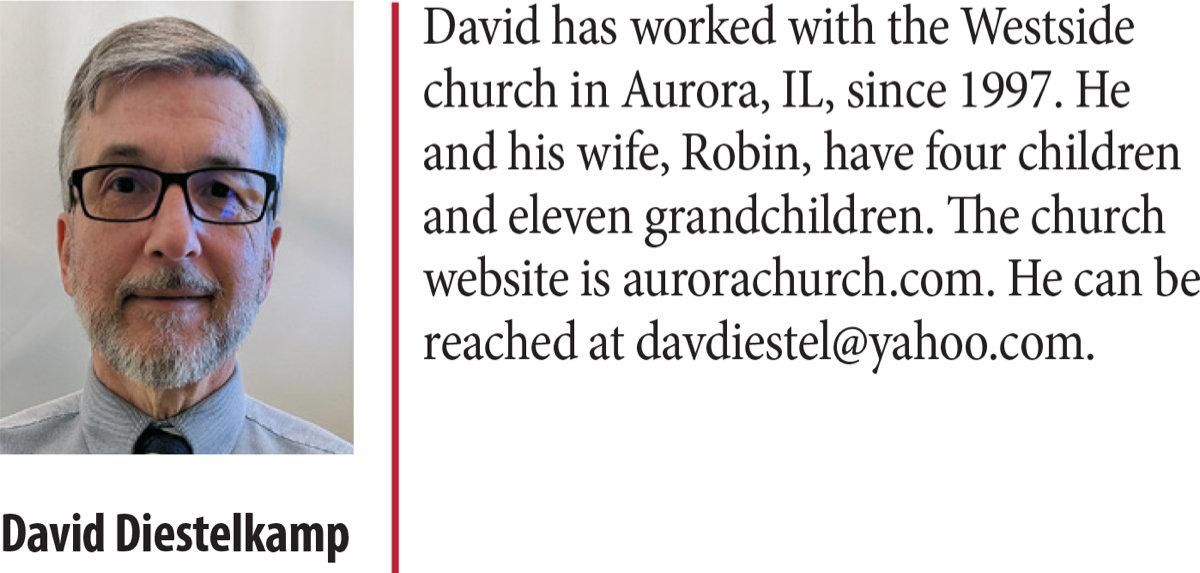by David Diestelkamp
Synopsis: The prophet Joel presents God’s intimidating judgment and the promise of deliverance, salvation, and His Spirit for those who turn to Him with their whole hearts.
When life seems messed up and things seem to be getting worse and worse, the book of Joel is for you. When you wonder what physical suffering should cause you to consider, the book of Joel is for you. When you think God isn’t the answer to your problems, the book of Joel is for you.
If you think life is difficult, that’s nothing new. Joel begins by asking the old men of Judah if they had ever seen anything like the recent devastating three waves of locusts that left virtually nothing behind them.
Closing your eyes to problems isn’t the answer. Joel wants drunkards to feel that there is nothing for them to drink. They are to see the fields and grain are ruined, new wine is dried up, there is no oil. They have hit rock bottom like a virgin whose betrothed has died, like a farmer or vinedresser whose crops and fruit are all destroyed.
Allow suffering and loss to turn you to God, not away from Him. Even though famine had left Judah with nothing to sacrifice to God, Joel tells the priests to, “Put on sackcloth and lament. . .” (1:13, ESV). They are to “Consecrate a fast, call a sacred assembly,” gather the elders and those living in the land to the house of the Lord, and “cry out to the Lord” (1:14). Things that turn people of the world away from God turn His people to Him.
Physical trials and suffering should remind you that we are fragile and we cannot survive God’s wrath and judgment, which are far more devastating than physical catastrophes. Joel writes, “Alas for the day! For the day of the Lord is at hand” (1:15). It’s an “Oh no!” moment of destruction from God. It’s not simply the locusts and famine—food is already cut off, the animals are groaning, the fields are scorched, and the brooks are dried up. Judah should have been reminded by these that they should fear the day of the Lord which would be far worse!
Life can get so bad that you may think it can’t get worse, but we have to see that God’s judgment will be far worse than anything we can imagine, if we abandon Him. Joel tries to magnify God’s judgment by describing a terrifying physical army. “The day of the Lord” is alarming, dark and gloomy. His army is great and strong, like no army that has ever been, or ever will be. They are like horses, like roaring chariots, mighty men who run, climb, and march without breaking ranks. “The earth quakes before them, the heavens tremble; the sun and moon grow dark, and the stars diminish their brightness” (2:10). Truly, “. . . the day of the Lord is great and very terrible,” and it begs us to ask, “Who can endure it?” (2:11).
When you are feeling the terror of your sinfulness, turning back to God is the answer. “Turn to Me with all your heart, with fasting, with weeping, and with mourning” (2:12). Joel says “rend your heart” and not just tear your outward clothing in mourning. This is to be a deep, brokenhearted, humble, genuine sorrow for sin that is in response to God’s grace, mercy, slowness to anger, great kindness, and willingness to relent from doing harm. Joel urges them to reach out to God in fasts, and in a “sacred assembly” that gathers literally everyone—from the elders and priests to the children, nursing babes, bridegrooms, and brides.
“Turn to me with all your heart” may be intimidating to you—it’s a big commitment. Joel assures, “Then the Lord will be zealous for His land, and pity His people” (2:18). The reasons for reproach will be taken away, and blessings will overflow. The “northern army” will be removed “far from you.” Joy and gladness will return to the “children of Zion.” People will see that “the Lord has done marvelous things!” (2:21). Repentance turns fear of judgment to praising “the name of the Lord your God, Who has dealt wondrously with you” (2:26). “Then you shall know that I am in the midst of Israel: I am the Lord your God and there is no other” (2:27).
During times of suffering or threats of judgment, God can feel far from you, but He promises His Spirit. To penitent Israel God says, “It shall come to pass afterward that I will pour out My Spirit on all flesh” (2:28). The time will come when God will return to His people and it will be obvious: sons and daughters will prophesy, old men will experience dreams, and young men will see visions. “I will show wonders in the heavens and in the earth. . .” (2:30-31). Figurative apocalyptic language is used to describe the magnitude of “the coming of the great and awesome day of the Lord” (2:31): Blood, fire, smoke, darkened sun, and the moon into blood. These are images of intimidating and awe-striking power.
You may not believe it, but Joel is about salvation—Israel’s and ours. “It shall come to pass that whoever calls on the name of the Lord shall be saved” (2:32). Israel was looking at famine and devastation, but if they turned back to God, “in Mount Zion and in Jerusalem, there shall be deliverance” (2:32). Judgment of sin is real; so are God’s mercy, grace, and deliverance. There will be a “remnant whom the Lord calls” (2:32).
As tempting as it may be during times of suffering or deprivation, you do not want to side with God’s enemies. Joel warns that God would judge the nations who scattered His people and sold them, took their land, and violently shed innocent blood, because “their wickedness is great” (3:13). The nations will be gathered in “the valley of decision” and a roar of the Lord from Zion will shake everything, “But the Lord will be a shelter for His people” (3:16). God’s enemies will experience desolation, but a new era of holiness and blessing will open for His people, and it “shall flow from the house of the Lord” (3:18).
Joel was written for our learning (Rom. 15:4). It is one of the hardest prophets to date. Although this locust plague was especially severe, similar (though lesser) events were frequent. Additionally, the apocalyptic language can be challenging to interpret. However, the lessons concerning the certainty of God’s judgment, the consistency of His justice, and the need for His people to repent and remain faithful are painfully clear in Joel.
Joel looks to their future when “it shall come to pass afterward” (2:28) that there is the outpouring of God’s Spirit, deliverance, salvation, and abundant blessings. Israel waited a long time for that day to dawn and finally, when the Holy Spirit was poured out on the Day of Pentecost in Acts 2, Peter was moved by the Spirit to say, “this is what was spoken by the prophet Joel: ‘And it shall come to pass in the last days, says God, that I will pour out of My Spirit on all flesh’” (Acts 2:16-17). The days of Joel had begun!
There is a lot of controversy surrounding what is said in Joel 2 and Acts 2 concerning the Holy Spirit and miraculous gifts. It is often forgotten that the miraculous gifts were not an end in themselves, but were intended to be evidence of the outpouring of the Spirit. Furthermore, the outpouring of the Spirit also wasn’t an end, but evidenced that the day had come when “whoever calls on the name of the Lord shall be saved” (Joel 2:32; Acts 2:21). In rejecting Jesus, Israel had once more rejected their God and faced His judgment for their sins. When Peter exhorted those on Pentecost to “Repent, and each of you be baptized in the name of Jesus Christ for the forgiveness of your sins; and you will receive the gift of the Holy Spirit. For the promise is for you and your children and for all who are far off, as many as the Lord our God will call to Himself” (Acts 2:38–39)—he was reaching back to Joel’s, “lament,” “mourn,” “be ashamed,” “rend your hearts,” and “return to me” in obedience, and “call on the name of the Lord.” They did that when they “received his word and were baptized” (Acts 2:41). God’s Spirit has returned to His spiritual Israel, and through Christ, He has brought overflowing blessing: deliverance and salvation from their sins that shake heaven and earth! Through obedience to the gospel, we have access to that for which the prophets looked and longed (1 Pet. 1:10-12).


